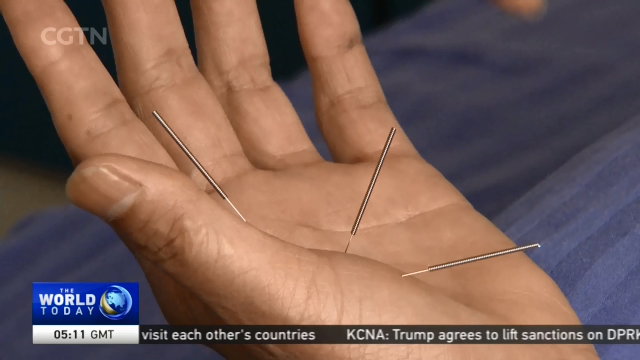
14:02, 13-Jun-2018
Pinpointing Acupuncture: Chinese scientists make breakthroughs in understanding treatment
02:24

Traditional Chinese medical treatments have been around for millennia - and embraced the world over. Scientists, however, are skeptics by profession - and look for that ultimate seal of approval: "proof." CGTN's Frances Kuo reports - researchers are stepping up to the challenge - and finding some success linking traditional methods - to modern science.
Acupuncture originated in China thousands of years ago and is popular today all over the world. Practitioners insert thin needles through the skin of a patient - stimulating what they call "acupoints" - to improve a whole host of conditions. But despite generations of anecdotal accounts of its effectiveness, there's never been absolute scientific proof that it works. Recently though, Chinese scientists have made breakthroughs in understanding. Key to acupuncture's effectiveness is the location of the acupoints - found where there are concentrations of human Mast Cells - tied to our immune system.
HUANG MENG RESEARCH ASSISTANT, FUDAN UNIVERSITY "The Mast cell has a kind of sensitive protein that can feel the stimulation. When it's activated, the cell releases a kind of bio-active matter, which will, in turn, stimulate the blood capillaries and nerves around it. This will produce a signal for the curative effect."
Scientists say they hope their work can improve acupuncture treatments around the world - by eventually establishing clinical standards for treatment of various diseases.
XIA YING PROFESSOR, FUDAN UNIVERSITY "At present, there is not a universal standard for acupuncture treatment. We are working to obtain data to provide support to modern acupuncture science."
Like acupuncture, herbal medicines lack scientific proof. But research is starting to catch up in this field, too.
LIN ZHIFEN PROFESSOR, TONGJI UNIVERSITY "Traditional Chinese Medicine aims to adjust the body's homoeostasis by stimulating the immune system. It has the best effect when the herbal dosage is at the level of equilibrium."
That means - you don't want to take too many herbs. Experts say the philosophy of Traditional Chinese Medicine is different from that of the West. While Western medicine mainly targets pathogens directly, its Chinese counterpart promotes balance and the body's own immunity. Now as we increasingly see a trend where East meets West these approaches used together, we are finding a path of science can lead to both. FRANCES KUO, CGTN.

SITEMAP
Copyright © 2018 CGTN. Beijing ICP prepared NO.16065310-3
Copyright © 2018 CGTN. Beijing ICP prepared NO.16065310-3